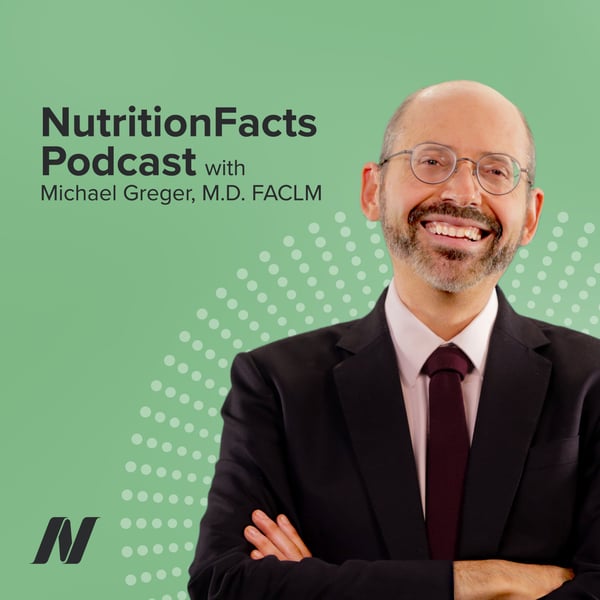Fasting and Cancer (Part II)
Nutrition Facts with Dr. Greger
[email protected]
4.8 • 3.6K Ratings
🗓️ 26 January 2023
⏱️ 12 minutes
🧾️ Download transcript
Summary
This episode features audio from Fasting Before and After Chemotherapy Put to the Test and Fasting-Mimicking Diet Before and After Chemotherapy. Visit the video pages for all sources and doctor's notes related to this podcast.
Transcript
Click on a timestamp to play from that location
| 0:00.0 | We have a lot of choices to make about our diet. Add to that doing the right thing when it comes to preventing or treating a chronic disease, fighting a virus or losing weight, and suddenly our nutrition choices can seem almost overwhelming. |
| 0:16.0 | Well, I'm here to help. Welcome to the Nutrition Facts Podcast. I'm your host, Dr. Michael Greger. |
| 0:23.0 | Today, we conclude our two-part series on fasting and cancer, and we start with a story about how the benefits of short-term fasting translate in the clinical setting. |
| 0:33.0 | The first randomized prospective clinical evaluation of the effects of fasting on chemotherapy, the incidence of chemotherapy induced nausea and vomiting in cancer patients was published in 2014. |
| 0:46.0 | But the patients were dogs. Cancer-bearing dogs presenting at a veterinary hospital were randomized to be fasted for 24 hours before chemotherapy, and those that were were significantly less likely to suffer from vomiting, only one in 10 compared to two out of three in the non-facet group, which is great. |
| 1:07.0 | But what can that tell us about human medicine? Evidality not much. It's nearly impossible to rely on most animal data to predict whether or not an intervention will have a favorable clinical benefit risk ratio in human subjects. |
| 1:23.0 | For example, mice have a metabolic rate approximately seven times higher than humans, so a single day of fasting can cut lean body mass about 15%. I would take over a month of fasting in people, so that dramatic study on mice showing 100% alive versus 100% dead on high-dose chemo, depending on whether they were fasted for 60 hours, what can that really tell us? |
| 1:48.0 | And when it comes to cancer, rodents compare massive tumor loads, whereas people generally waste weight and die when tumor masses reach just a thousandth of our body weight. |
| 2:00.0 | You can't even necessarily extrapolate from one rat to another, even within the same strain, bought from different dealers. The only way to see what happens in humans, the only way to guarantee findings are relevant is the study, people. |
| 2:14.0 | The theory is that combining fasting cycles with chemotherapy could extend the survival of advanced stage cancer patients by both returning tumor progression and reducing side effects, or even providing an alternative to chemotherapy altogether in early stage cancer patients, but that's all contingent on it being confirmed in human clinical trials. |
| 2:37.0 | First, there were case series several patients diagnosed with a variety of cancers, elected to undertake fasting prior to chemotherapy and shared their experiences. |
| 2:47.0 | Those who underwent chemo both within without fasting reported a reduction of fatigue, weakness, and gastrointestinal side effects while fasting. In fact, felt better across the board with zero vomiting in the fasting group. |
| 3:01.0 | The weight loss during the first few days of fasting was rapidly recovered in most of the patients and did not lead to any detectable harm. |
| 3:08.0 | So overall was looking feasible, safe with the potential to a millerate side effects, but only randomized clinical studies could tell for sure. And so here we go. |
| 3:20.0 | Breast and avarian cancer patients fasting, starting 36 hours before and ending 24 hours after chemotherapy, and it did appear to improve the quality of life and fatigue. |
| 3:31.0 | But another study found no such beneficial effects. There did appear to perhaps be less bone marrow toxicity, giving the higher counts of red blood cells and platelet making cells, but no benefit when it came to killing off white blood cells, the immune system cells. |
| 3:48.0 | So that was a disappointment. Perhaps they didn't fast long enough, they only fasted 24 hours before and after. |
| 3:56.0 | To find out the optimal duration, 20 cancer patients were split up into three groups, fasting for 24, 48, or a total of 72 hours, all those in the 24-hour group suffered nausea after chemo, but less than half in the 72-hour group. |
| 4:13.0 | And most were vomiting in the 24-hour group, but none in the longest fasting group. |
| 4:19.0 | Longer fasting groups also tend to suffer less nerve damage and less serious bone marrow suppression. |
| 4:25.0 | Even after 24 hours of fasting, two cycles of chemo can knock people's white blood cells down to sub-optimal levels, but with 72 hours, chemo knocked their immune system down, but not out. |
| 4:38.0 | Okay, so short-term fasting may reduce chemotherapy induced toxicity, but what I want to know is if it makes it work better. |
... |
Please login to see the full transcript.
Disclaimer: The podcast and artwork embedded on this page are from [email protected], and are the property of its owner and not affiliated with or endorsed by Tapesearch.
Generated transcripts are the property of [email protected] and are distributed freely under the Fair Use doctrine. Transcripts generated by Tapesearch are not guaranteed to be accurate.
Copyright © Tapesearch 2025.

